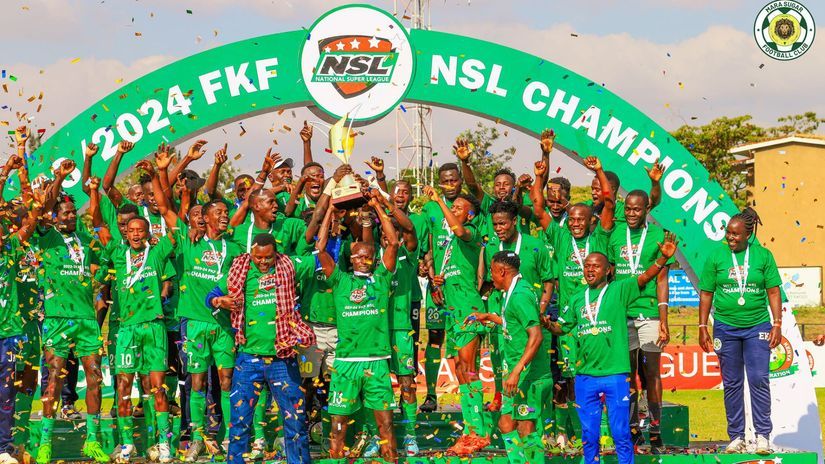The start of the 2024/2025 National Super League (NSL) season has been unexpectedly postponed, with the new kickoff date now set for September 21, 2024. This delay, confirmed by the Football Kenya Federation (FKF), has left many clubs and fans surprised, especially given the weeks of intense pre-season preparation by the 20 participating teams. In this article, we explore the reasons behind the delay, the implications for the clubs, and how they can best adapt to the changing circumstances.
Financial Concerns Behind the Delay
According to the FKF’s communication to the clubs, the postponement was due to “recent developments.” However, insider sources suggest that the real reason for the delay is rooted in financial concerns. Specifically, club chairmen have reportedly requested assistance from the FKF to cover the fees for match officials in the upcoming season. The financial strain on clubs, coupled with the additional costs of officiating, appears to have necessitated a pause in the league’s start to ensure these issues are addressed.
The request for financial support underscores the ongoing challenges many NSL clubs face. Operating on tight budgets, these teams often struggle to cover essential expenses, and the additional burden of match officials’ fees has evidently been a tipping point. The FKF’s decision to delay the season is likely a response to these financial concerns, aimed at giving clubs the time and resources needed to manage their obligations effectively.
Rescheduled Pre-Season Meeting and License Reviews
In addition to the season’s delayed start, the pre-season meeting initially scheduled for September 3, 2024, has also been pushed back to September 17, 2024. This meeting is crucial for outlining the modus operandi of the league, discussing logistical details, and ensuring that all participating clubs are on the same page regarding the season’s expectations and requirements.
Moreover, the review of license applications for the NSL teams, which is a critical step in the league’s operation, is currently underway. The First Instance Body (FIB) began reviewing these applications on September 2, 2024, and decisions are expected to be communicated between September 12 and 16, 2024. The licensing process is vital as it ensures that all clubs meet the required standards for participation in the league, covering aspects such as financial stability, infrastructure, and administrative capacity.
The Impact on NSL Clubs: Challenges and Opportunities
For the 20 NSL clubs, the delay represents both a challenge and an opportunity. On one hand, the postponement extends the period of uncertainty, potentially disrupting the momentum built during pre-season training. Clubs that had meticulously planned their schedules and transfer activities around the original start date now face the challenge of maintaining player fitness, focus, and morale during this extended wait.
The delay could also strain the financial resources of clubs even further. Extended pre-season periods often mean additional costs for training, player salaries, and logistics, all of which can be burdensome for clubs already operating on tight budgets. The request for FKF assistance in covering match officials’ fees highlights the precarious financial situation many teams find themselves in.
On the other hand, the delay offers an extended window for preparation. Clubs can use this additional time to fine-tune their tactics, strengthen their squads, and address any lingering issues that may have arisen during pre-season. For teams that have been dealing with injuries or other disruptions, the extra time could prove beneficial in ensuring they start the season in peak condition.
The Road to Promotion: Staying Focused Amid Uncertainty
One of the most significant impacts of the delay is on the clubs’ aspirations for promotion to the FKF Premier League. With promotion being the ultimate goal for many NSL teams, the uncertainty surrounding the start of the season adds pressure to maintain focus and momentum. Teams must adapt to the changing schedule while keeping their eyes firmly on the prize.

To stay competitive, clubs will need to manage their extended pre-season effectively. This involves maintaining a balance between physical training, tactical drills, and mental preparedness. Coaches and managers will play a crucial role in ensuring that players remain motivated and focused, despite the shifting timeline. Additionally, clubs should use this time to strengthen their squads, either through additional signings or by promoting talent from their youth ranks.
Communication will also be key during this period. Clubs must stay in close contact with the FKF to stay informed about any further developments or changes. Clear communication within the teams is equally important, as players and staff need to be kept updated on any adjustments to the training schedule or league preparations.
Looking Ahead: Preparing for the New Kickoff Date
As the new kickoff date of September 21, 2024, approaches, NSL clubs will need to finalize their preparations and ensure that they are ready to hit the ground running. This means not only focusing on the physical and tactical aspects of the game but also ensuring that all administrative and logistical matters are in order.
The pre-season meeting on September 17, 2024, will be a critical event for the clubs, providing an opportunity to clarify any outstanding issues and finalize plans for the season. Clubs should approach this meeting with a clear agenda and a focus on resolving any lingering concerns, particularly those related to financial support and logistics.
In the days leading up to the new start date, clubs should intensify their training and preparation efforts, ensuring that players are match-ready and fully attuned to the tactical plans laid out by their coaches. The extra time provided by the delay should be viewed as an opportunity to enter the season in the best possible shape, ready to compete for promotion and achieve their goals.
Conclusion
The postponement of the 2024/2025 NSL season has introduced new challenges for the participating clubs, but it also offers opportunities for further preparation and fine-tuning. As the new kickoff date of September 21, 2024, approaches, clubs must remain focused, adapt to the changing circumstances, and use this extended pre-season period to their advantage. With promotion to the FKF Premier League at stake, the teams that best manage this period of uncertainty will be the ones most likely to succeed in the upcoming season.


